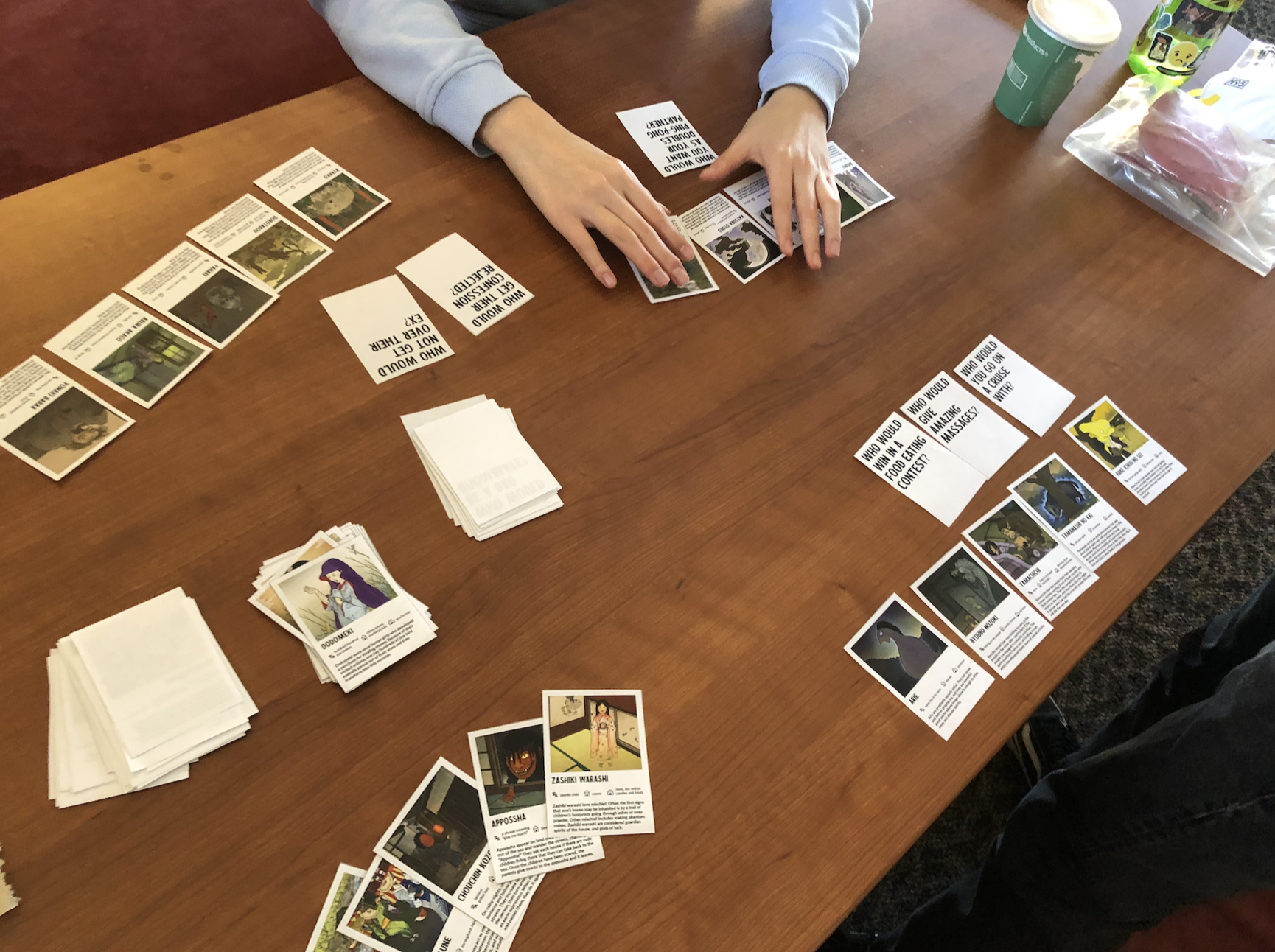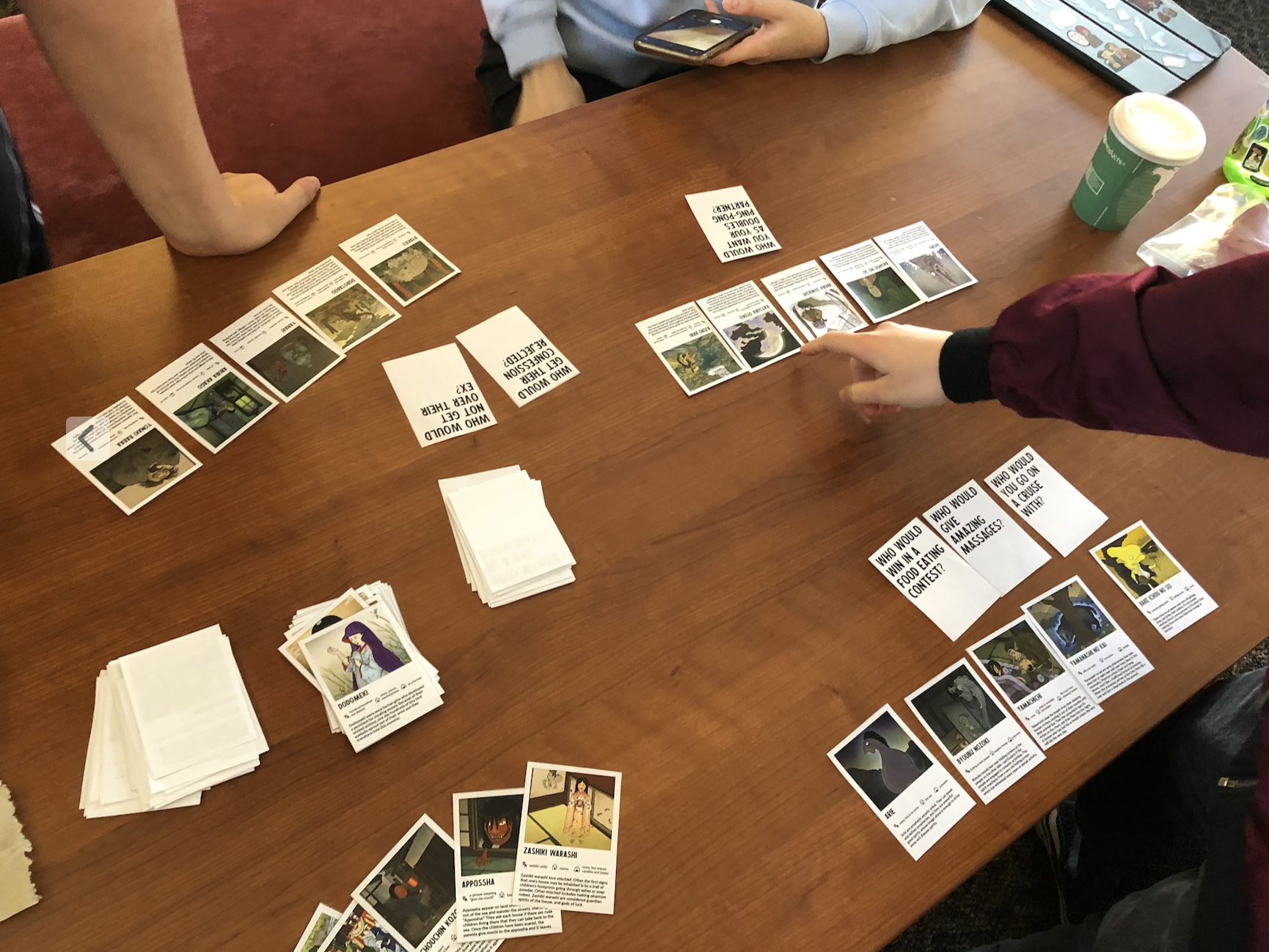P1 by Thomas Hsieh, Katherine Liu, Kavita Selva, Melody Yang

Yokaipedia is a social game that teaches players about yokai, or Japanese spirits. Players match yokai cards to prompts, explain their choice, and then collectively choose the best match. The game includes social and narrative fun: players must come up with a story to pitch their choice, and the yokai that win are usually the ones with the most entertaining stories. Most of the prompts use relatable modern-day contexts, which helps enhance the social fun. Games similar to this game include Apples to Apples and Cards Against Humanity. We wanted to make a game like this because we wanted to encourage players to tell stories and laugh, while learning something new. We knew that there were many yokai with interesting stories, so we thought it would be a great fit for this game format. One of our concerns was that players may not actually retain the names of or information about the yokai. However, our main goal was to have players remember the stories about yokai. To assess this, we noted what prompts and stories players talked about after they played, and whether they could remember specific details about the yokai they played. We also noticed how engaged the players were when giving their pitches and listening to others’.
Game Rules:
Yokai (妖怪) are supernatural spirits and entities found in Japanese folklore. There are hundreds, if not thousands of different types. You may have heard of some of the more famous yokai, such as the Kitsune and the Tanuki, but have you heard of the Shirime or the Amabiko? Many yokai are scary and bloodthirsty, but many are also silly and goofy. Yokaipedia will introduce you to yokai of all kinds!
- Each player starts the game with 5 Yokai cards.
- A Prompt card is drawn and each player takes ~1 minute to choose a Yokai and come up with a corresponding story to match the prompt.
- Players go around in a circle and one-by-one pitch their Yokai as it fits to the prompt.
- After the pitches are done, players simultaneously point to whoever they think should win the prompt card (players are not allowed to point to themselves). Whoever gets the most votes wins the prompt card. If there is a tie, players re-vote with only the tied participants as options.
- After the round, discard all used Yokai cards. Each person draws another Yokai card (keep 5 in the hand).
- The first person to obtain 3 Prompt cards wins (this number can change depending on desired game length).
Game Bits:
- 72 Yokai cards. Each has a color picture of the yokai, its Japanese name, the English translation of its name, its habitat, its diet, and a short description.
- 36 Prompt cards. Each has a short question or superlative on it, such as “Who would your parents not approve of?” or “Most improved.”
Assessment:
We assessed the game by whether players could retain stories about the yokai, and how engaged they were when saying or listening to pitches. To measure information retention, we looked at player behavior after the game. If players referenced specific prompts or stories that were memorable, we took that as a measure of success. We did not require players to remember the names, diets, or habitats of the specific yokai. This supports the game’s goal of teaching yokai to the players.
We measured engagement by body language and narrative quality. If players used hand gestures, made eye contact with other players, spoke emotionally, and/or tried to make strong arguments, we took that as a sign that they were invested in their pitch. We also measured engagement by noting whether players laughed or made comments during pitches, took time to decide on the best pitch, and/or complimented and encouraged each other after the pitches. These metrics support the game’s goal of creating narrative and social fun, and teaching storytelling skills.
History
Our original version of this game was inspired by Monikers, a charades-type game that has three different rounds with the same prompt cards repeated in each round – with the rounds being 1) describing the prompt card without using any of the words in the prompt, 2) describing the prompt card with only one word, and 3) acting out the prompt card. We were inspired by this game procedure because we found that players were able to retain information about the prompts even after the game had ended, days later.
Using this as inspiration, we came up with the idea of learning about different mythical creatures around the world, and ideated different round types that could contribute to learning. These round types included a prompt component – matching the yokai to a specific prompt which people would vote on for the best match, a speed component – matching a mythical creature card to a certain prompt (“this creature can fly”) as well as a geographic component – identifying the origin of the creature on a map-type game board that would be shared among the players. However, after more ideation we decided to simplify the game to focus specifically on Japanese yokai, with the hope that this pinpointed topic would facilitate better factual retention post-game. After researching the yokai and noticing their memorable corresponding pictures and descriptions, we decided to simply use the prompt component of the game since we found that players could retain the information after just this round, and it would limit playtime to a more reasonable length.


Playtesting: 5 players (18F — Humanities Undergrad, 22F — CS Coterm, 22F — CS Undergrad, 22 — MechE Graduate Student, 22M — CS Undergrad)



This sounds like a cute, lighthearted game!!
A few comments:
1. I think you could clarify the gameplay incentives here a bit more. Since the yokai are folklore and the stories are fabricated by players, on what basis does someone win? Their creative story-telling abilities? Do the questions on the prompt cards relate to yokai folklore, or are they just random questions?
2. Learning objectives could be more concrete regarding what you hope this game imparts to players—if all stories are made up, what are the players actually learning? Your learning assessment metrics sound valid and interesting, and it would be great to hear more specifics how players measure up against these metrics.
3. For future projects, please document more specifics what you learned from each playtest (based on your own observations and player feedback), and exactly how this influenced the way you iterated upon the rules.